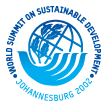 |
 |
 |

[ More information with Waternunc.com
] |
|
|
 |
 |
 |
 |
 |
 |
 |
 |
 |
 |
 |
|


29 May 2002
Preparatory Committee for the World Summit on Sustainable Development
Ministerial Level, Fourth Session, Bali, Indonesia, 27 May - 7 June 2002
Department of Public Information - News and Media Division
Preparatory Committee for the World
Summit on Sustainable Development
Fourth Session
4th Meeting (PM)
European Union Backs Development of New Partnership Initiative on Water
European Union Environment
Ministers have endorsed the development of a new partnership that aims to
reduce by half the number of people lacking access to clean water and proper
sanitation by 2015 in parts of Africa and in Central Asia.
The
15-country European Union, which already spends close to 1.5 billion euros a
year on water projects, mostly in Africa, sees the World Summit on Sustainable
Development as an opportunity to enter into partnerships with governments,
non-governmental organizations and the private sector to pull together widely
disparate and uncoordinated programmes and turn them into a coherent and
unified platform to tackle water problems.
At present, there are over
one billion people who lack access to fresh water, and twice that who lack
access to proper sanitation facilities. While there is an internationally
agreed upon target for improving access to clean water by 2015, there is not,
at present, a target for improving sanitation. Even if the present negotiations
on the outcome document for the Summit does not provide a target for
sanitation, the European Union will still work toward meeting the 2015 target,
EU officials say.
Palle Lindgaard-Jørgensen of the Danish
Environmental Protection Agency said the EU was fully committed to the target
on sanitation. " Our efforts have to be driven by targets. We are setting it
for ourselves."
The move by the European Union ministers provides a
significant boost to effort to move the water issue up on the list of political
priorities. United Nations Secretary-General Kofi Annan has identified water as
one of the five main areas where the Johannesburg Summit should concentrate to
achieve measurable results.
"We see water is not on the agenda of
political leaders," according to Friedrich Barth, an EU water specialist.
Building roads, he said, is seen as necessary, but the role of water in
economic development, in health, and in promoting peace and security is
overlooked.
"This initiative seeks to push the water up on the
political agenda at Johannesburg," he said. "You have to realize, if you don't
make progress on water, you don't make progress on sustainable
development."
Barth said the initiative would help implement the
document presently under consideration at the Bali PrepCom, and which will be
adopted in Johannesburg this August.
The details of the new initiatives
still have to be worked out between now and Johannesburg, but according to
Barth, the main objective is to coordinate all the different water-related
activities that are now ongoing. A number of building blocks for the
partnerships are in place, he said, with support from the EU environment
ministers, the recognition of a water crisis by African water ministers-and the
EU initiative-at a recent meeting in Abuja, Nigeria, and the many
non-governmental organizations presently working on projects.
But a
priority for the initiative would be to help establish strong governance. "The
water problem is not a crisis over having it," Barth said. Rather, he said, "it
is a crisis over management and national legislation.
The development
of a framework could help improve water management at the regional and local
levels. Proper management of transboundary rivers, of which there are 60 in
Africa, could lay the groundwork for regional cooperation.
The
initiative also sees a role for the private sector to help develop
infrastructure and for investment in resources, but Barth emphasized that there
was no agenda for privatization of water resources in the target countries.
"The EU believes in public ownership of water resources," he said.
But
the private sector will not go into a country where there is a risk, Barth
said, and it was therefore necessary to establish good governance practices.
The initiative, possibly with the help of official development assistance,
could provide guarantees to cover some of the risk, he said, but emphasized
that the governance issue was key. "They won't go in if they can't protect
their investment."
"If there is a strong government, there can be
strong regulation," Barth said. "Then it doesn't matter if the service is
provided by the public or private sector. That's how it is back home."
Details concerning financial resources and innovative mechanism still have
to be worked out, but Barth said there are considerable resources already in
the pipeline that can aid the partnerships, and the new commitments made at the
International Conference on Financing for Development in Monterrey could be
made available. But first, Barth said, the issue of ownership by the developing
countries must be addressed, since that is a key principle of European
development aid. "The demand," Barth said, "has to come from the developing
countries through the existing ODA procedures."
Discussions on the
proposed initiative will be held in Bali at the ministerial level between the
EU and African and the former Soviet Union republics next week, and it is
envisioned that Heads of State will jointly launch the initiative in
Johannesburg.
|
|
 |
 |
 |
 |
 |
 |
 |
 |
 |
 |
|
